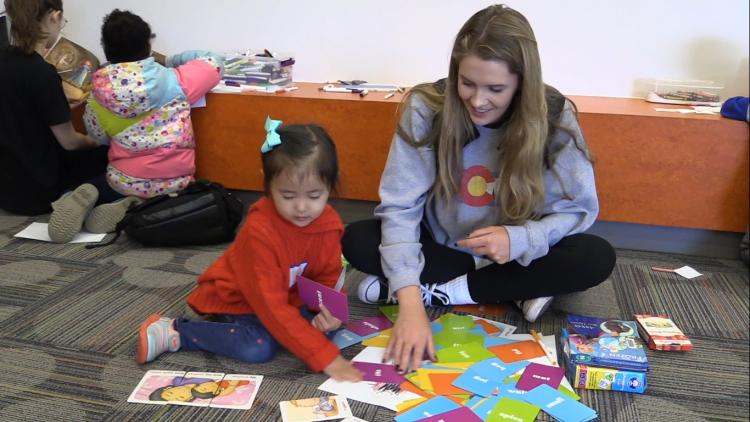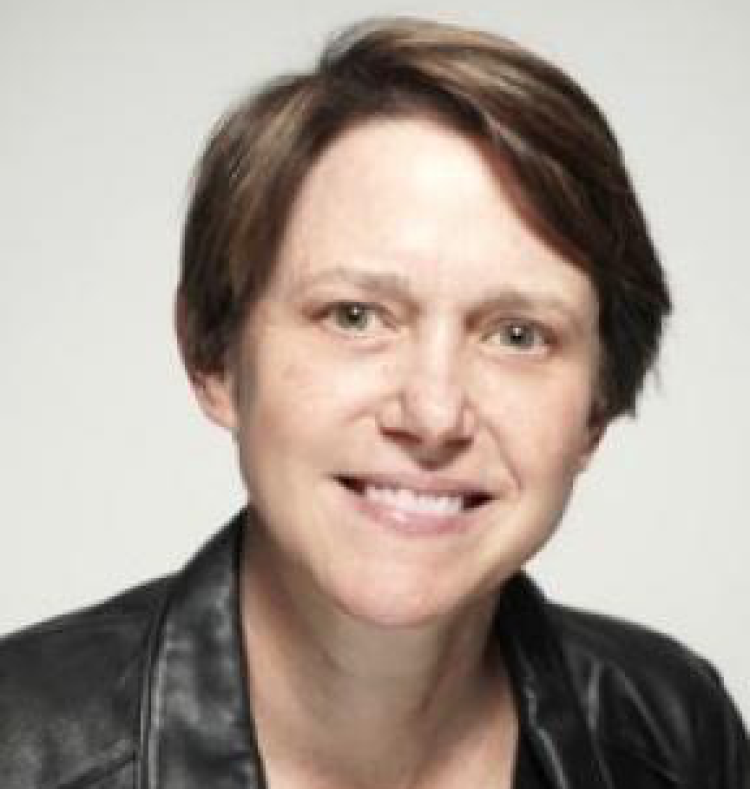Literacy program helps teachers and students, prof says
CU Boulder literacy practicum a boon to students and community members alike, director says
Kira Hall isn’t a big fan of the term “service learning.”
“The notion of service seems to suggest that people are giving up their precious time to help others,” says Hall, professor of linguistics and anthropology and director of the Literacy Practicum program at the University of Colorado Boulder.

CU Boulder student Susan Ruth McInerney works with Arya during the spring 2017 Reading Buddies program at the Boulder Public Library. At the top of the page, CU Boulder student Marodyiah Hamzah works with Brittany in fall 2018 at the Family Learning Center. Photos courtesy of Kira Hall.
She thinks of the program, which is funded by the Office of Outreach and Engagement, as community-based learning.
After all, when Literacy Practicum students go into the community to work with students or adults on reading, writing and other communications skills, they are gaining valuable experience and education themselves.
“You are enabling the goal of learning through practice instead of sitting in a room hearing a lecture,” Hall says.
Hall has overseen the practicum, which started in the Department of Linguistics, since 2007. One longstanding program is Reading Buddies, in which CU students link up with kindergarten through fifth-grade students at the Boulder Public Library and, in a recent addition, bilingual University Hill Elementary School. The practicum also works with Boulder’s Family Learning Center, matching practicum students with adolescents from homes where English is often not the primary language.
“Our students are learning Spanish, too, seeing how the kids code-switch between two languages and how they navigate the whole English-Spanish world,” Hall says.
Another avenue, the Student Worker Alliance Program (SWAP), which connects practicum students with CU Boulder employees who speak English as a second language, often opens students’ eyes to marginalization and hierarchies within their own community, Hall says.

Kira Hall
“Some students are inspired to get politically involved after SWAP,” she says.
The practicum, which has received numerous awards from CU Outreach and CU Engage, often helps students to escape an insulated campus experience, Hall says.
“Students can go through four or five years here without ever meeting someone from the Boulder community who is not associated with the university, and it’s really powerful for them to have that experience,” she says.
Students involved with the program agree.
“I am thankful that I came across this program and often wonder why it’s not a bigger program … here on this campus,” three-semester veteran Thomas Jung wrote in a blog post on the program website. “It has a great purpose and there is no losing. Everybody wins in this situation and gets something you wouldn't be able to experience anywhere else.”
While the program still focuses heavily on reading skills, in recent years it has continued to expand on the idea of literacy to include the basic skills needed to “navigate everyday life and be a successful citizen,” from writing checks to ordering online.
“This is not a monolingual nation, though it pretends to be. It’s really challenging for students and adults who don’t speak English as a first language to live in a place like Boulder, which is not very diverse,” she says.
Working with such community members can help students understand the challenges faced by people whom they otherwise might never even meet, Hall says. She believes programs like the literacy practicum are powerful evidence against stereotypes that academic communities wall themselves off from the real world.
“A lot of the divisions today are fueled by the perception that the educational system and academia are completely divorced from everyday, real life in the United States,” she says. “That’s a strong perception that I don’t necessarily agree with. But that’s also why you can’t be paternalistic when you tread this territory. When you go out into the community, you want to make it beneficial to all involved, not ‘Here I am to help you.’”

